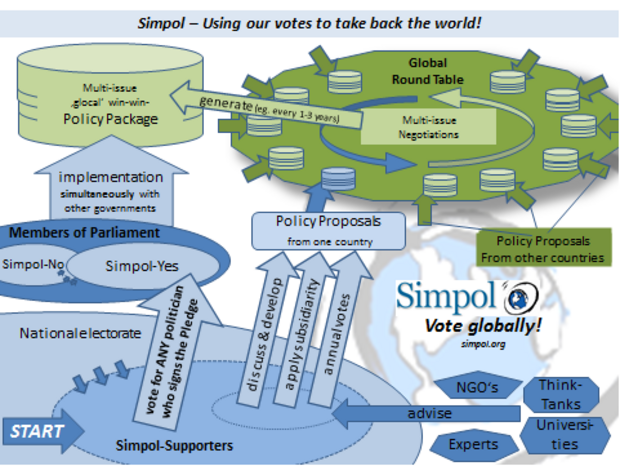Our policy
The Simultaneous Policy is a series of multi-issue policy packages to solve global problems. Each package will be implemented at the same time, on precisely the same date, by all or sufficient nations. But what issues would those policy packages include, how are they being put together, and by whom?
What makes a Simultaneous Policy?
There are three criteria that define a Simultaneous Policy:
1. Simultaneous Implementation
To avoid any nation suffering a competitive disadvantage, each Simultaneous Policy package must be implemented by all or sufficient nations at the same time, on the same date.
2. Subsidiarity and Protecting National Sovereignty
Not every issue needs to be covered by a Simultaneous Policy. At Simpol, we are only concerned with global issues that need all nations (or a very large number of nations) to work. If an issue can be resolved by a nation alone, without any significant negative consequences for its international competitiveness, it doesn't qualify for being included in a Simultaneous Policy.
For example – what a nation may decide regarding the death penalty or abortion will not have any significant impact on its attractiveness to international businesses or investors, therefore it isn’t something that requires international cooperation to solve. While we, at Simpol, are passionate about many issues, it is only those that require global and simultaneous implementation that qualify for consideration.
3. Multi-issue framework
Each Simultaneous Policy package will bring together two or more issues that meet the above criteria. Instead of treating an issue like carbon emission reductions in isolation, we will combine it with another issue – such as a global financial transactions tax.
Simpol combines multiple issues because addressing any single issue in isolation inevitably means some nations winning and others losing. When you look at the 2015 Paris Climate Agreement, you can see that the big carbon emitters like the U.S. and China have much more to do, and lose, by entering into the agreement. This only undermines their commitment or causes them to abandon the agreement altogether.
That’s why Simpol combines two or more issues into one policy package, so that what a nation might lose on one issue, it can gain on another. That way, immediate action becomes in all nations' interests.
For more on Policy Development at Simpol, download our Information Pack.
Policy Content
The content of each Simultaneous Policy package will be developed using a specially designed process involving citizens in democratic countries and the governments of all countries. To understand how this would work, please see pages 7-11 of our Information Pack.
Once a Simultaneous Policy package has been developed and agreed by all or sufficient nations, they implement it simultaneously on a mutually agreed date. Subsequent packages follow the same process. The process only begins when enough nations have signed the Simpol Pledge. Until then, we continue to campaign to get politicians, political parties and governments to sign it.
We are also working with experts and academics to model potential Simultaneous Policy packages in advance.


